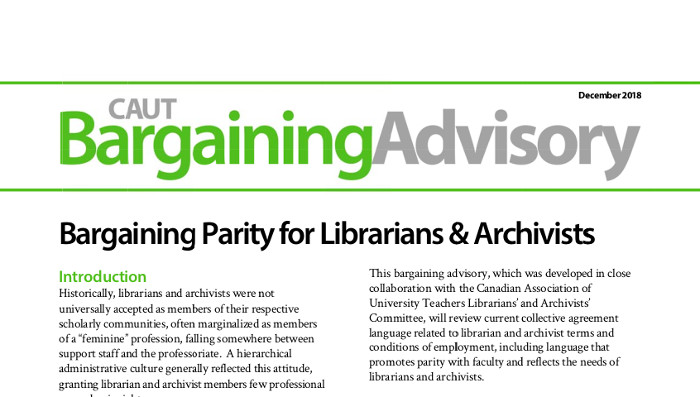Last month the Canadian Association of University Teachers (CAUT), an association of academic faculty associations and unions, released Bargaining Parity for Librarians and Archivists, an eight-page bargaining advisory that covers all the major issues for academic librarians and archivists in collective agreements, with examples of good language from different contracts across the country.
Here’s the announcement:
One of the greatest barriers to librarians and archivists accessing their academic rights is their definitional separation from the rest of the academic staff. This bargaining advisory, also available on-line in the members’ only section of the CAUT website, reviews current collective agreement language related to librarian and archivist terms and conditions of employment, including language that promotes parity with faculty and reflects the needs of librarians and archivists.
It will be of interest to any librarian or archivist involved in bargaining or revising collective agreements, and will be helpful to others who want to know more about these issues and how they affect us (especially professors on bargaining teams).

I am on the Librarians’ and Archivists’ Committee right now and helped write the advisory. It was a complex project and took a while, and I’m delighted it’s now out. Thanks to all the other committee members and the CAUT people involved. It’s a good committee, and CAUT does great work.
CAUT doesn’t make its bargaining advisories publicly available because it doesn’t want employers to have access to the expertise it provides to unions. I understand that point, and I’m never going to out of my way to help management in labour negotiations, but I don’t think this advisory should be restricted this way. It’s the only thing I’ve written in my professional career that isn’t freely available online somewhere. Perhaps we’ll be able to change CAUT policy one day!
Nevertheless the advisory is available to those who need it. Anyone in Canada who’s in an association or union that’s a CAUT member can get it on the web site (your union will have a username and password; just ask) and in the US I presume there’s a way to go through the AAUP to get it. Or just ask one of us on the committee. (Aussi disponsible en français.)
 Miskatonic University Press
Miskatonic University Press